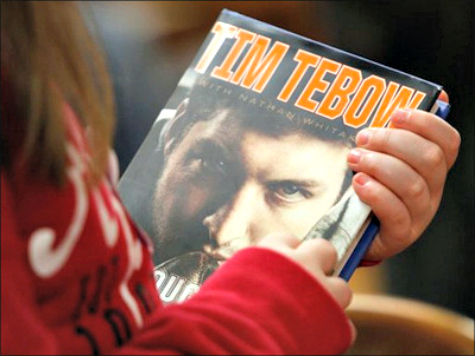Is it “fair” that illegal immigrants and foreign exchange students are allowed to play high school football on Friday nights and to participate in extra curricular activities at public schools, while many of their peers, who are legal US citizens but who happen to be homeschooled, are being denied “equal” access to the same opportunities in their local communities?
In Virginia last week, seven Democrats and a lone Republican, perhaps unaware or unmoved by such a discrepancy, made the point moot and rejected the so called “Tebow Bill” that sought to “level the playing field.”
In the weeks preceding the committee vote, the national media took an interest in Virginia’s version of the “Tebow Bill.” Most notably, Laura Ingraham, “the most listened-to woman in political talk radio in the United States,” had a memorable exchange discussing the measure on her show with guest Ken Tilley, Executive Director of the Virginia High School League (VHSL) and a fierce opponent of the bill. According to the Washington Post “The current ban against home-schoolers is the result of long-standing policy set by the Virginia High School League, which governs interscholastic sports and other activities in Virginia’s more than 300 high schools.”
After Tilley put forth several reasons for the opposition such as “participation is a privilege not a right” and “equity and fairness,” Ingraham, whose conservatism, wisdom and wit is like kryptonite to the left’s speciousness, took to task Tilley’s “equity arguments.” Ingraham highlighted how exemptions seemingly are being made for every group except homeschoolers and the country’s big push for inclusiveness doesn’t include tax paying parents that choose to homeschool. At one point, Ingraham asked Tilley if undocumented immigrants have to have parents residing in the attendance zones to compete and the response given was “We don’t address that point.”
By calling out the practice of giving exemptions to some (illegal immigrants and foreign exchange students) but denying similar treatment to others (homeschooled US citizens), Ingraham invalidated Tilley’s core talking points. More importantly, Ingraham offered a new dynamic over “what’s fair” conspicuously absent in both previous and current debates.
Although many leftists believe they own a monopoly on the terms and conditions of how to define and apply “fairness,” Ingraham forcefully demonstrated how the left’s pretense of “equity” and “fairness” can collapse upon closer examination. When pointed questions like Ingraham’s are introduced, “Professional” politicians and educators frequently become exposed not only by their opposition to measures like the “Tebow Bill,” but also by their mannered sincerity.
These “professionals” love to lecture about the notions of “fairness,” of “equal access,” and of “a commitment to united excellence” in education, yet circle the wagons year after year to deny 14 and 15 year old homeschoolers the opportunity to tryout for the high school basketball or debate team. What exactly are these “professionals” dedicated to? Do they seek to promote a safe and healthy environment to educate and develop every child, or only those students who attend “their” public schools?
In view of current exemptions, people’s overwhelming support, and legislative provisions, arguments against the “Tebow Bill” appear small and punitive. For example, in a 2010 article, Tilley said “By playing by a different set of rules it’s inequitable and unfair to public school students.” He added “the parents of homeschooled students have voluntarily chosen not to participate in the free public school system in order to educate their children at home. That’s fine, but in making that choice they have also chosen to forgo the privileges incidental to public education. One of which is the opportunity to play athletics.”
Tilley’s notion of “choice” further invalidates his argument. Most likely, illegal immigrants parents did not give their children a choice to stay behind when the decision was made to ignore our nation’s rules and enter the country illegally. American’s, nevertheless, are compassionate and even the most fervent advocates for stricter immigration laws, can both appreciate and understand that a child should not be punished for his parents actions.
Why then do “Tebow Bill” opponents believe it’s “fair” and “equitable” to punish teenage homeschoolers because their law-abiding tax-paying parents made a different choice on how to educate best their children?
Even the Washington Post’s position has evolved from skeptical to acceptable. According to a recent editorial “State athletic officials ought to look for a solution that preserves a level playing field but doesn’t deny local school districts or their students the important right to choose.” What’s more, a January 2013 survey released by the Commonwealth Educational Policy Institute indicated 67% of Virginian’s “favored allowing students who are homeschooled to participate on local public school sport teams.”
Over the years, proponents have worked to address various objections and the proposed bill is a common sense and comprehensive solution. Currently, the “Tebow bill” stipulates that only home-schoolers who meet specific eligibility, disciplinary, and residency criteria can be eligible to try out for high school extracurricular activities or sports. For example, to comply with academic requisites, homeschoolers must provide standardized test scores or undergo an annual review by the school system.
The bill also provides for individual localities, not the state, to decide if home-schoolers should be allowed to participate or not. Additional provisions in the bill prevent students from “school shopping” and allows localities to charge homeschoolers any additional fees incurred as a result of their joining the team or club.
Home schoolers are asking only for the opportunity to compete and want to earn a roster spot not take one away. They may not walk the halls with their public school peers during the day, but that shouldn’t disqualify them as potential teammates in the afternoon. Ultimately, as more people are made aware of the opposition’s false arguments, their false posturing “of wanting everyone to play by the same rules,” and their false definitions of “fairness,” homeschoolers should be optimistic about next year’s prospects for the “Tebow Bill” to pass and become law.

COMMENTS
Please let us know if you're having issues with commenting.